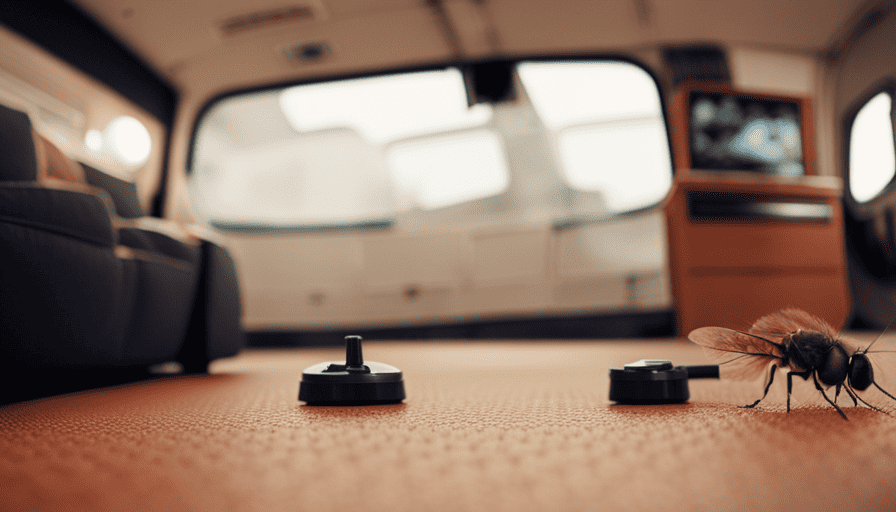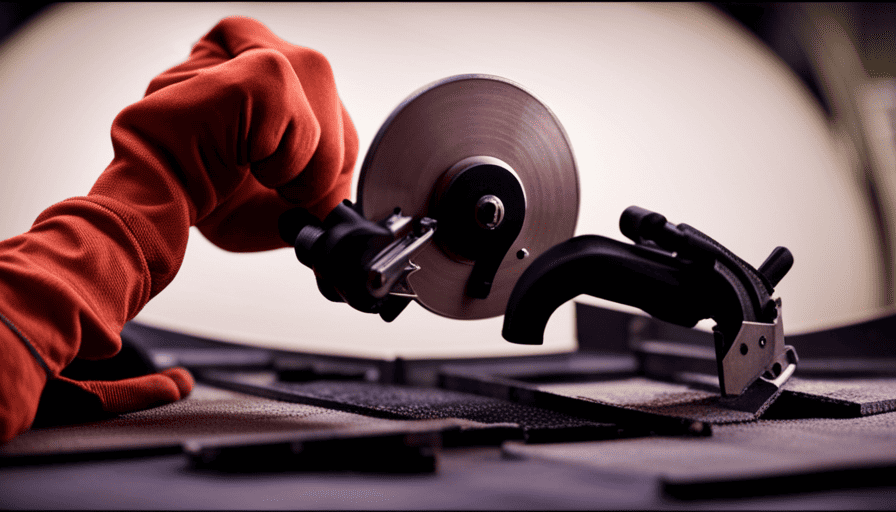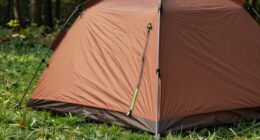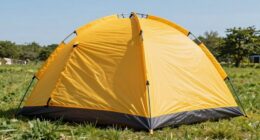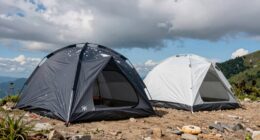Picture this: You are enjoying a peaceful camping trip in the cozy confines of your camper, surrounded by the beauty of the great outdoors. Suddenly, your serene getaway is interrupted by unwanted guests – mice! These pesky rodents have the ability to turn your idyllic camping experience into a nightmare. But fear not, because I have the perfect solution for you.
In this article, I will share my tried and true methods for getting rid of mice in a camper. We’ll start by identifying and sealing entry points to ensure those little intruders can’t find their way in. Then, we’ll eliminate any food sources that may be attracting them. I’ll also show you how to use natural repellents and set traps effectively.
But it doesn’t stop there! I’ll guide you through cleaning and decluttering your camper, as well as calling in professional exterminators if needed. Finally, I’ll share some tips for preventing future infestations.
So, let’s dive in and make sure those mice never ruin your camping adventures again!
Key Takeaways
- Identify and seal entry points to prevent mice from entering the camper
- Remove food sources and properly store food to eliminate attractants for mice
- Use natural repellents and traps with bait to deter and capture mice
- Consider professional extermination services for thorough inspection, effective techniques, and valuable prevention advice
Identify and Seal Entry Points
Now it’s time to start hunting down those sneaky little mice and plugging up any holes or cracks they may be using to get inside your cozy camper.
Rodent proofing techniques are essential to keep these unwanted guests out. First, inspect your camper thoroughly, looking for any possible entry points. Common entry points for mice in campers include gaps around pipes and wiring, damaged screens or vents, and even small cracks in the walls or floors.
Once you’ve identified these areas, it’s time to seal them up. Use a combination of materials such as steel wool, caulk, and expanding foam to fill in any openings. Pay close attention to areas where different materials meet, as these are often vulnerable points. Remember, mice can squeeze through tiny openings, so be meticulous in your efforts.
By taking the time to seal off these entry points, you’ll greatly reduce the chances of mice finding their way inside your camper. Now that your camper is secure, let’s move on to the next step: removing food sources.
Remove Food Sources
To effectively eliminate mice in a camper, it’s crucial to remove any food sources that may attract them. Mice are opportunistic creatures and will be drawn to any available food. Here are some steps you can take to remove food sources and discourage mice from entering your camper:
-
Proper waste disposal: Make sure to dispose of garbage promptly and properly. Store trash in sealed containers and dispose of it regularly to prevent mice from accessing food scraps.
-
Eliminating standing water: Mice need water to survive, so it’s essential to eliminate any standing water sources in or around your camper. Check for leaks, fix any plumbing issues, and ensure that there’s no stagnant water nearby.
-
Keep food stored securely: Store all food in airtight containers or in the refrigerator. Avoid leaving any food out on countertops or tables where mice can easily access it.
-
Clean up spills and crumbs: Regularly clean up any spills or crumbs that may attract mice. Use a vacuum or broom to remove any food particles from the floor and surfaces.
-
Seal food containers: Ensure that all food containers are properly sealed to prevent mice from chewing through them.
By following these steps and removing food sources, you can significantly reduce the likelihood of mice infestation in your camper.
In the next section, we’ll discuss natural repellents to further deter these pests.
Use Natural Repellents
One great way to keep those pesky critters away from your camper is by using natural repellents. DIY mouse deterrents are a cost-effective and safe option to repel mice.
There are several natural ways to repel mice that you can try. One effective method is to use peppermint oil. Mice are repelled by the strong scent of peppermint, so simply soak cotton balls in peppermint oil and place them around your camper.
Another natural repellent is vinegar. Mix equal parts of vinegar and water in a spray bottle and spray it around areas where mice are likely to enter, such as doors and windows. The strong smell will deter them from coming inside.
Additionally, cloves and cayenne pepper are also known to repel mice. Sprinkle these spices around your camper to create a barrier that mice will avoid.
By using these natural repellents, you can create an inhospitable environment for mice and keep them away from your camper.
Now, let’s move on to the next step: setting traps.
Set Traps
Before we proceed, it’s important to address the issue of trapping those pesky critters in your camper. Setting traps is a highly effective method to get rid of mice and prevent further infestations.
When it comes to bait selection, opt for something that’s highly appealing to mice, such as peanut butter, chocolate, or dried fruit. These baits have a strong scent that’ll attract the mice and increase the chances of trapping them.
Proper trap placement is crucial for success. Place the traps in areas where mice are commonly seen, such as near food storage areas, under sinks, or along walls. Make sure to set the traps perpendicular to the wall, as mice typically run along walls. Additionally, place the traps in secluded areas to avoid startling the mice and reducing their likelihood of approaching the trap.
Once you’ve successfully trapped the mice, it’s important to clean and declutter the camper to prevent future infestations. By removing any potential food sources, such as crumbs or open food containers, you can discourage mice from returning to your camper. Additionally, decluttering the camper will eliminate hiding spots for mice, making it more difficult for them to establish a presence.
Clean and Declutter the Camper
Cleaning and decluttering your camper is essential for keeping those pesky critters away. Not only will a clean and organized space make it less inviting for mice to make a home, but it’ll also help you identify and eliminate any potential hiding spots.
Here are some organizing essentials and cleaning hacks to help you in your battle against mice:
-
Start by removing all unnecessary clutter from your camper. Mice love to hide in piles of clothes, stacks of paper, and other cluttered areas. Keep your belongings organized in storage bins or drawers to minimize hiding spots.
-
Vacuum and mop regularly to eliminate any food crumbs or spills that might attract mice. Don’t forget to clean under and behind furniture, as well as inside cabinets and drawers.
-
Seal up any cracks or holes in your camper. Mice can squeeze through tiny openings, so it’s important to inspect your camper thoroughly and use caulk or steel wool to seal any entry points.
-
Use natural deterrents such as peppermint oil or dryer sheets to repel mice. These scents are unpleasant to them and can help keep them away.
By following these cleaning and organizing tips, you’ll create an environment that’s less appealing to mice.
In the next section, we’ll discuss how to use ultrasonic devices to further deter these unwanted guests.
Use Ultrasonic Devices
To keep those unwanted critters away, try using ultrasonic devices in your camper. Ultrasonic devices are electronic devices that emit high-frequency sound waves that are inaudible to humans but can be disturbing to pests like mice. The idea behind these devices is that the sound waves will create an uncomfortable environment for the mice, causing them to leave the area.
But do ultrasonic devices really work? Well, the effectiveness of these devices in repelling mice is a topic of debate. Some people swear by them, claiming that they’ve successfully kept mice away from their campers. Others, however, are skeptical and believe that these devices are nothing more than a gimmick.
The truth is, the effectiveness of ultrasonic devices can vary depending on the specific situation. Factors such as the size of the camper, the severity of the mouse infestation, and the layout of the space can all play a role in determining whether or not these devices will work.
If you’ve tried using ultrasonic devices and are still dealing with a mouse problem in your camper, it may be time to consider calling in professional exterminators. These experts have the knowledge and tools to effectively eliminate mice from your camper and prevent them from returning.
Call in Professional Exterminators
If all else fails, it’s time to bring in the experts and let professional exterminators take care of the persistent pests infiltrating your cozy camper. When it comes to getting rid of mice, calling in professional exterminators is a smart choice. Here are the benefits of professional extermination services:
-
Thorough Inspection: Professional exterminators are trained to conduct a comprehensive inspection of your camper to identify all the areas where mice might be hiding. This ensures that no corner is left unchecked and all potential entry points are sealed off.
-
Effective Treatment: Exterminators use specialized techniques and products that are highly effective in eliminating mice. They know the best methods to eradicate the current infestation and prevent future ones.
-
Safe and Environmentally Friendly: Professional extermination services prioritize the safety of your family and the environment. They use eco-friendly products and methods that are not harmful to humans or pets.
When it comes to cost-effective ways to prevent mouse infestations, professional exterminators can provide valuable advice. They can recommend sealing any gaps or cracks, keeping food properly stored, and maintaining cleanliness to discourage mice from returning.
By hiring professional exterminators, you can ensure a mice-free camper and have peace of mind. However, preventing future infestations is equally important. So, let’s explore some preventative measures to keep those pesky critters away for good.
Prevent Future Infestations
One interesting statistic to consider is that 90% of mouse infestations can be prevented by properly sealing entry points and keeping food stored in airtight containers. To keep mice out of your camper, it’s crucial to identify and seal any potential entry points. Mice can squeeze through tiny openings, so it’s important to inspect and seal gaps around windows, doors, vents, and pipes. Use steel wool or caulk to seal these openings and prevent mice from entering.
Another way to keep mice out is by eliminating their access to food. Mice are attracted to easily accessible food sources, so it’s important to store your food properly. Always store food in airtight containers made of glass or metal, as mice can easily chew through plastic or cardboard. Additionally, keep your camper clean and free of crumbs or spilled food, as these can also attract mice.
Signs of a mouse infestation include droppings, gnaw marks, and the presence of nesting materials. If you notice any of these signs, it’s important to take immediate action to prevent the infestation from spreading. By sealing entry points and properly storing food, you can significantly reduce the chances of a mouse infestation in your camper.
Moving on to the next section about storing food properly…
Store Food Properly
To prevent future infestations of mice in your camper, it’s important to take steps to eliminate their access to food. Proper food storage is essential in keeping these pesky rodents away. By storing your food properly, you can significantly reduce the chances of attracting mice into your camper.
One effective way to store food is by using airtight containers. These containers create a barrier that mice cannot penetrate, keeping your food safe and secure. Additionally, avoid leaving any food out in the open, as this will only entice mice to come inside. Instead, store all food items in sealed containers or in the refrigerator.
To provide a visual representation of these ideas, here is a table outlining proper food storage techniques:
| Proper Food Storage Techniques |
|---|
| Use airtight containers |
| Store food in sealed containers or in the refrigerator |
| Avoid leaving food out in the open |
By following these proper food storage techniques, you can greatly reduce the likelihood of attracting mice into your camper. To further protect your camper from infestations, it’s important to regularly inspect and maintain the camper. Transitioning into the subsequent section, let’s explore how to do just that.
Regularly Inspect and Maintain the Camper
Regularly inspecting and maintaining your camper is crucial for ensuring a pest-free and comfortable environment. Not only will it help keep mice away, but it will also extend the lifespan of your camper and prevent any potential damage. By following a few simple steps, you can effectively inspect your camper for mouse infestations and take necessary actions to get rid of them.
One of the first things you should do is to check for any holes or gaps in the exterior of your camper. Mice can squeeze through tiny openings, so make sure to seal off any potential entry points with caulk or steel wool.
Additionally, inspect the underside of your camper for signs of rodent activity, such as chew marks or droppings.
Inside the camper, pay close attention to the areas where food is stored or prepared. Clean up any crumbs or spills immediately and store food in airtight containers. Check cabinets, closets, and other hidden spaces for signs of mouse nests, such as shredded paper or insulation.
Regularly inspecting your camper and taking preventative measures will greatly reduce the chances of a mouse infestation. By sealing off entry points and maintaining a clean environment, you can enjoy your camper without the unwanted company of pests. Remember, early detection and proactive maintenance are key to keeping mice away from your camper.
Frequently Asked Questions
What are some signs that indicate a mouse infestation in a camper?
Some signs that indicate a mouse infestation in a camper include finding droppings, chewed wires or insulation, and gnaw marks on furniture or food containers. You may also notice a strong, unpleasant odor.
To prevent mice from entering a camper, seal any gaps or holes with steel wool or caulk, store food in airtight containers, and keep the camper clean and clutter-free. Regularly inspecting and maintaining the camper can help identify and address any potential entry points for mice.
Can mice chew through metal or plastic to gain entry into a camper?
Yes, mice can indeed chew through metal or plastic to gain entry into a camper. They have sharp teeth that can gnaw through various materials. To prevent this, it’s important to use mouse control methods and prevention techniques.
This includes sealing any gaps or cracks in the camper with metal mesh or caulk, storing food in airtight containers, and keeping the camper clean and clutter-free. By taking these steps, you can minimize the risk of mice entering your camper.
Is it safe to use chemical repellents in a camper to get rid of mice?
Using chemical repellents in a camper to get rid of mice may not be the safest option. Instead, I recommend exploring chemical-free alternatives and natural ways to deter mice. These methods are not only safer for you and your camper, but they’re also effective.
Consider using peppermint oil, which mice dislike, or placing cotton balls soaked in vinegar around the camper. Additionally, sealing any possible entry points and keeping the camper clean and free of food sources will help prevent mice from entering in the first place.
How long does it typically take for traps to catch a mouse?
Typically, it doesn’t take long for traps to triumph over tricky mice. Homemade mouse traps can be made using household items like cardboard tubes or buckets. These traps can be baited with cheese or peanut butter to entice the critters.
To prevent mice from entering your camper, seal any cracks or openings they may use as entry points. Additionally, keep food stored in airtight containers and maintain cleanliness to discourage their presence.
Are there any specific cleaning products that are effective in removing mouse droppings and urine from a camper?
To effectively remove mouse droppings and urine from a camper, I recommend using natural alternatives to chemical cleaning products. One effective technique is to mix equal parts vinegar and water in a spray bottle and thoroughly clean the affected areas. This solution not only removes the odor but also acts as a deterrent for mice.
Additionally, you can sprinkle peppermint oil or place cotton balls soaked in peppermint oil around the camper to prevent mice from entering.
Are the Methods for Getting Rid of Mice in a Regular House Different from Those in a Camper?
When dealing with a mice infestation, the methods for getting rid of them in a regular house can differ from those in a camper. In a regular house, sealing any entry points and setting traps may be more effective, while in a camper, using peppermint oil or electronic repellents may be more practical. For both environments, keeping a clean space and removing any food sources are crucial tips for removing mice infestation.
Conclusion
In conclusion, getting rid of mice in a camper can be a frustrating experience, but with the right techniques, it’s absolutely possible. Here are the steps you can take:
- Identify and seal entry points.
- Remove food sources.
- Use natural repellents.
- Set traps.
- Clean and declutter the camper.
- Call in professional exterminators.
- Take steps to prevent future infestations.
Remember to store food properly, regularly inspect and maintain the camper, and take proactive measures to keep mice at bay. With these solutions in place, you can enjoy a mouse-free camper experience.


